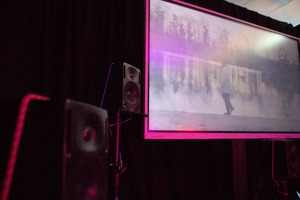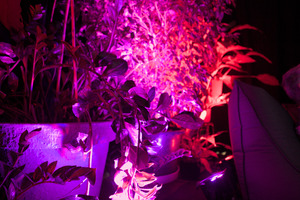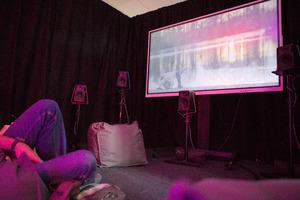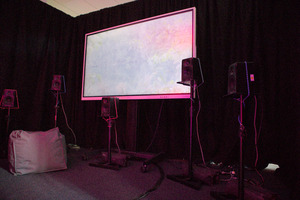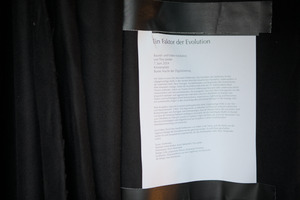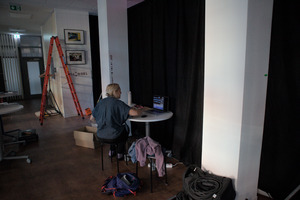"Film / Video"
| Begriff | Film / Video |
| Metakey | Typ des Projekts/Werks (creative_work:type) |
| Typ | Keyword |
| Vokabular | Werk |
123 Inhalte
- Seite 1 von 11
Ansichten von A Factor of Evolution in Triangel Studio
- Titel
- Ansichten von A Factor of Evolution in Triangel Studio
- Autor/in
- Beschreibung (en)
- We live in times of high competition. Survival of the fittest is the omnipresent motto in most fields of human action, especially in the western world. This philosophy was only established about 200 years ago and manifested by Charles Darwin and especially the Social Darwinists at the end of the 19th century. They believed that according to a law of nature, only the physically strongest and most aggressive individuals and species would survive in the struggle for life. Many Social Darwinists justified therefore capitalism and racism with devastating consequences in the coming decades until nowadays.
Peter Kropotkin is attempting in his philosophical work Mutual Aid: A Factor of Evolution (1902) to dismantle their arguments and based on numerous observations of zoologists and anthropologists, he proves, that the fittest species are the most sociable ones and that sociability develops intelligence, which is the most powerful arm in the struggle for survival. This includes insects, animals and humans. Higher moral sentiments and compassion is also essential for survival in all societies.
The ritual burning of sage in nature should help to cleanse the negative energy of social darwinism in our world and make room for a more cooperative society, that will secure the well-being of all members, even the most weak ones and furthermore facilitate a more sustainable, safe and content society.
- We live in times of high competition. Survival of the fittest is the omnipresent motto in most fields of human action, especially in the western world. This philosophy was only established about 200 years ago and manifested by Charles Darwin and especially the Social Darwinists at the end of the 19th century. They believed that according to a law of nature, only the physically strongest and most aggressive individuals and species would survive in the struggle for life. Many Social Darwinists justified therefore capitalism and racism with devastating consequences in the coming decades until nowadays.
- Typ des Projekts/Werks
- Schlagworte
- Datierung
- 07.06.2024
- Mitwirkende
- Ort: Institution
- Ort
- Karlsruhe
- Stadt
- Land
- Beteiligte Institution(en)
- Titel
- Ansichten von A Factor of Evolution in Triangel Studio
- Titel (en)
- Views of A Factor of Evolution in Triangle Studio
- Urheberrechtshinweis
- Tina Jander; photo: Víctor Fancelli Capdevila
- Rechtsschutz/Lizenz
- Freigabe Nutzung HfG
- Medienersteller/in
- Beziehung/Funktion
- Alternativ-Text (de)
- Ansichten von A Factor of Evolution in Triangel Studio
- Alternativ-Text (en)
- Views of A Factor of Evolution in Triangle Studio
- Importiert am
- 10.06.2024
- Übergeordnete Sets
- 1
Ansichten von A Factor of Evolution in Triangel Studio
- Titel
- Ansichten von A Factor of Evolution in Triangel Studio
- Autor/in
- Beschreibung (en)
- We live in times of high competition. Survival of the fittest is the omnipresent motto in most fields of human action, especially in the western world. This philosophy was only established about 200 years ago and manifested by Charles Darwin and especially the Social Darwinists at the end of the 19th century. They believed that according to a law of nature, only the physically strongest and most aggressive individuals and species would survive in the struggle for life. Many Social Darwinists justified therefore capitalism and racism with devastating consequences in the coming decades until nowadays.
Peter Kropotkin is attempting in his philosophical work Mutual Aid: A Factor of Evolution (1902) to dismantle their arguments and based on numerous observations of zoologists and anthropologists, he proves, that the fittest species are the most sociable ones and that sociability develops intelligence, which is the most powerful arm in the struggle for survival. This includes insects, animals and humans. Higher moral sentiments and compassion is also essential for survival in all societies.
The ritual burning of sage in nature should help to cleanse the negative energy of social darwinism in our world and make room for a more cooperative society, that will secure the well-being of all members, even the most weak ones and furthermore facilitate a more sustainable, safe and content society.
- We live in times of high competition. Survival of the fittest is the omnipresent motto in most fields of human action, especially in the western world. This philosophy was only established about 200 years ago and manifested by Charles Darwin and especially the Social Darwinists at the end of the 19th century. They believed that according to a law of nature, only the physically strongest and most aggressive individuals and species would survive in the struggle for life. Many Social Darwinists justified therefore capitalism and racism with devastating consequences in the coming decades until nowadays.
- Typ des Projekts/Werks
- Schlagworte
- Datierung
- 07.06.2024
- Mitwirkende
- Ort: Institution
- Ort
- Karlsruhe
- Stadt
- Land
- Beteiligte Institution(en)
- Titel
- Ansichten von A Factor of Evolution in Triangel Studio
- Titel (en)
- Views of A Factor of Evolution in Triangle Studio
- Urheberrechtshinweis
- Tina Jander; photo: Víctor Fancelli Capdevila
- Rechtsschutz/Lizenz
- Freigabe Nutzung HfG
- Medienersteller/in
- Beziehung/Funktion
- Alternativ-Text (de)
- Ansichten von A Factor of Evolution in Triangel Studio
- Alternativ-Text (en)
- Views of A Factor of Evolution in Triangle Studio
- Importiert am
- 10.06.2024
- Übergeordnete Sets
- 1
Ansichten von A Factor of Evolution in Triangel Studio
- Titel
- Ansichten von A Factor of Evolution in Triangel Studio
- Autor/in
- Beschreibung (en)
- We live in times of high competition. Survival of the fittest is the omnipresent motto in most fields of human action, especially in the western world. This philosophy was only established about 200 years ago and manifested by Charles Darwin and especially the Social Darwinists at the end of the 19th century. They believed that according to a law of nature, only the physically strongest and most aggressive individuals and species would survive in the struggle for life. Many Social Darwinists justified therefore capitalism and racism with devastating consequences in the coming decades until nowadays.
Peter Kropotkin is attempting in his philosophical work Mutual Aid: A Factor of Evolution (1902) to dismantle their arguments and based on numerous observations of zoologists and anthropologists, he proves, that the fittest species are the most sociable ones and that sociability develops intelligence, which is the most powerful arm in the struggle for survival. This includes insects, animals and humans. Higher moral sentiments and compassion is also essential for survival in all societies.
The ritual burning of sage in nature should help to cleanse the negative energy of social darwinism in our world and make room for a more cooperative society, that will secure the well-being of all members, even the most weak ones and furthermore facilitate a more sustainable, safe and content society.
- We live in times of high competition. Survival of the fittest is the omnipresent motto in most fields of human action, especially in the western world. This philosophy was only established about 200 years ago and manifested by Charles Darwin and especially the Social Darwinists at the end of the 19th century. They believed that according to a law of nature, only the physically strongest and most aggressive individuals and species would survive in the struggle for life. Many Social Darwinists justified therefore capitalism and racism with devastating consequences in the coming decades until nowadays.
- Typ des Projekts/Werks
- Schlagworte
- Datierung
- 07.06.2024
- Mitwirkende
- Ort: Institution
- Ort
- Karlsruhe
- Stadt
- Land
- Beteiligte Institution(en)
- Titel
- Ansichten von A Factor of Evolution in Triangel Studio
- Titel (en)
- Views of A Factor of Evolution in Triangle Studio
- Urheberrechtshinweis
- Tina Jander; photo: Víctor Fancelli Capdevila
- Rechtsschutz/Lizenz
- Freigabe Nutzung HfG
- Medienersteller/in
- Beziehung/Funktion
- Alternativ-Text (de)
- Ansichten von A Factor of Evolution in Triangel Studio
- Alternativ-Text (en)
- Views of A Factor of Evolution in Triangle Studio
- Importiert am
- 10.06.2024
- Übergeordnete Sets
- 1
Ansichten von A Factor of Evolution in Triangel Studio
- Titel
- Ansichten von A Factor of Evolution in Triangel Studio
- Autor/in
- Beschreibung (en)
- We live in times of high competition. Survival of the fittest is the omnipresent motto in most fields of human action, especially in the western world. This philosophy was only established about 200 years ago and manifested by Charles Darwin and especially the Social Darwinists at the end of the 19th century. They believed that according to a law of nature, only the physically strongest and most aggressive individuals and species would survive in the struggle for life. Many Social Darwinists justified therefore capitalism and racism with devastating consequences in the coming decades until nowadays.
Peter Kropotkin is attempting in his philosophical work Mutual Aid: A Factor of Evolution (1902) to dismantle their arguments and based on numerous observations of zoologists and anthropologists, he proves, that the fittest species are the most sociable ones and that sociability develops intelligence, which is the most powerful arm in the struggle for survival. This includes insects, animals and humans. Higher moral sentiments and compassion is also essential for survival in all societies.
The ritual burning of sage in nature should help to cleanse the negative energy of social darwinism in our world and make room for a more cooperative society, that will secure the well-being of all members, even the most weak ones and furthermore facilitate a more sustainable, safe and content society.
- We live in times of high competition. Survival of the fittest is the omnipresent motto in most fields of human action, especially in the western world. This philosophy was only established about 200 years ago and manifested by Charles Darwin and especially the Social Darwinists at the end of the 19th century. They believed that according to a law of nature, only the physically strongest and most aggressive individuals and species would survive in the struggle for life. Many Social Darwinists justified therefore capitalism and racism with devastating consequences in the coming decades until nowadays.
- Typ des Projekts/Werks
- Schlagworte
- Datierung
- 07.06.2024
- Mitwirkende
- Ort: Institution
- Ort
- Karlsruhe
- Stadt
- Land
- Beteiligte Institution(en)
- Titel
- Ansichten von A Factor of Evolution in Triangel Studio
- Titel (en)
- Views of A Factor of Evolution in Triangle Studio
- Urheberrechtshinweis
- Tina Jander; photo: Víctor Fancelli Capdevila
- Rechtsschutz/Lizenz
- Freigabe Nutzung HfG
- Medienersteller/in
- Beziehung/Funktion
- Alternativ-Text (de)
- Ansichten von A Factor of Evolution in Triangel Studio
- Alternativ-Text (en)
- Views of A Factor of Evolution in Triangle Studio
- Importiert am
- 10.06.2024
- Übergeordnete Sets
- 1
Ansichten von A Factor of Evolution in Triangel Studio
- Titel
- Ansichten von A Factor of Evolution in Triangel Studio
- Autor/in
- Beschreibung (en)
- We live in times of high competition. Survival of the fittest is the omnipresent motto in most fields of human action, especially in the western world. This philosophy was only established about 200 years ago and manifested by Charles Darwin and especially the Social Darwinists at the end of the 19th century. They believed that according to a law of nature, only the physically strongest and most aggressive individuals and species would survive in the struggle for life. Many Social Darwinists justified therefore capitalism and racism with devastating consequences in the coming decades until nowadays.
Peter Kropotkin is attempting in his philosophical work Mutual Aid: A Factor of Evolution (1902) to dismantle their arguments and based on numerous observations of zoologists and anthropologists, he proves, that the fittest species are the most sociable ones and that sociability develops intelligence, which is the most powerful arm in the struggle for survival. This includes insects, animals and humans. Higher moral sentiments and compassion is also essential for survival in all societies.
The ritual burning of sage in nature should help to cleanse the negative energy of social darwinism in our world and make room for a more cooperative society, that will secure the well-being of all members, even the most weak ones and furthermore facilitate a more sustainable, safe and content society.
- We live in times of high competition. Survival of the fittest is the omnipresent motto in most fields of human action, especially in the western world. This philosophy was only established about 200 years ago and manifested by Charles Darwin and especially the Social Darwinists at the end of the 19th century. They believed that according to a law of nature, only the physically strongest and most aggressive individuals and species would survive in the struggle for life. Many Social Darwinists justified therefore capitalism and racism with devastating consequences in the coming decades until nowadays.
- Typ des Projekts/Werks
- Schlagworte
- Datierung
- 07.06.2024
- Mitwirkende
- Ort: Institution
- Ort
- Karlsruhe
- Stadt
- Land
- Beteiligte Institution(en)
- Titel
- Ansichten von A Factor of Evolution in Triangel Studio
- Titel (en)
- Views of A Factor of Evolution in Triangle Studio
- Urheberrechtshinweis
- Tina Jander; photo: Víctor Fancelli Capdevila
- Rechtsschutz/Lizenz
- Freigabe Nutzung HfG
- Medienersteller/in
- Beziehung/Funktion
- Alternativ-Text (de)
- Ansichten von A Factor of Evolution in Triangel Studio
- Alternativ-Text (en)
- Views of A Factor of Evolution in Triangle Studio
- Importiert am
- 10.06.2024
- Übergeordnete Sets
- 1
Ansichten von A Factor of Evolution in Triangel Studio
- Titel
- Ansichten von A Factor of Evolution in Triangel Studio
- Autor/in
- Beschreibung (en)
- We live in times of high competition. Survival of the fittest is the omnipresent motto in most fields of human action, especially in the western world. This philosophy was only established about 200 years ago and manifested by Charles Darwin and especially the Social Darwinists at the end of the 19th century. They believed that according to a law of nature, only the physically strongest and most aggressive individuals and species would survive in the struggle for life. Many Social Darwinists justified therefore capitalism and racism with devastating consequences in the coming decades until nowadays.
Peter Kropotkin is attempting in his philosophical work Mutual Aid: A Factor of Evolution (1902) to dismantle their arguments and based on numerous observations of zoologists and anthropologists, he proves, that the fittest species are the most sociable ones and that sociability develops intelligence, which is the most powerful arm in the struggle for survival. This includes insects, animals and humans. Higher moral sentiments and compassion is also essential for survival in all societies.
The ritual burning of sage in nature should help to cleanse the negative energy of social darwinism in our world and make room for a more cooperative society, that will secure the well-being of all members, even the most weak ones and furthermore facilitate a more sustainable, safe and content society.
- We live in times of high competition. Survival of the fittest is the omnipresent motto in most fields of human action, especially in the western world. This philosophy was only established about 200 years ago and manifested by Charles Darwin and especially the Social Darwinists at the end of the 19th century. They believed that according to a law of nature, only the physically strongest and most aggressive individuals and species would survive in the struggle for life. Many Social Darwinists justified therefore capitalism and racism with devastating consequences in the coming decades until nowadays.
- Typ des Projekts/Werks
- Schlagworte
- Datierung
- 07.06.2024
- Mitwirkende
- Ort: Institution
- Ort
- Karlsruhe
- Stadt
- Land
- Beteiligte Institution(en)
- Titel
- Ansichten von A Factor of Evolution in Triangel Studio
- Titel (en)
- Views of A Factor of Evolution in Triangle Studio
- Urheberrechtshinweis
- Tina Jander; photo: Víctor Fancelli Capdevila
- Rechtsschutz/Lizenz
- Freigabe Nutzung HfG
- Medienersteller/in
- Beziehung/Funktion
- Alternativ-Text (de)
- Ansichten von A Factor of Evolution in Triangel Studio
- Alternativ-Text (en)
- Views of A Factor of Evolution in Triangle Studio
- Importiert am
- 10.06.2024
- Übergeordnete Sets
- 1
Ansichten von A Factor of Evolution in Triangel Studio
- Titel
- Ansichten von A Factor of Evolution in Triangel Studio
- Autor/in
- Beschreibung (en)
- We live in times of high competition. Survival of the fittest is the omnipresent motto in most fields of human action, especially in the western world. This philosophy was only established about 200 years ago and manifested by Charles Darwin and especially the Social Darwinists at the end of the 19th century. They believed that according to a law of nature, only the physically strongest and most aggressive individuals and species would survive in the struggle for life. Many Social Darwinists justified therefore capitalism and racism with devastating consequences in the coming decades until nowadays.
Peter Kropotkin is attempting in his philosophical work Mutual Aid: A Factor of Evolution (1902) to dismantle their arguments and based on numerous observations of zoologists and anthropologists, he proves, that the fittest species are the most sociable ones and that sociability develops intelligence, which is the most powerful arm in the struggle for survival. This includes insects, animals and humans. Higher moral sentiments and compassion is also essential for survival in all societies.
The ritual burning of sage in nature should help to cleanse the negative energy of social darwinism in our world and make room for a more cooperative society, that will secure the well-being of all members, even the most weak ones and furthermore facilitate a more sustainable, safe and content society.
- We live in times of high competition. Survival of the fittest is the omnipresent motto in most fields of human action, especially in the western world. This philosophy was only established about 200 years ago and manifested by Charles Darwin and especially the Social Darwinists at the end of the 19th century. They believed that according to a law of nature, only the physically strongest and most aggressive individuals and species would survive in the struggle for life. Many Social Darwinists justified therefore capitalism and racism with devastating consequences in the coming decades until nowadays.
- Typ des Projekts/Werks
- Schlagworte
- Datierung
- 07.06.2024
- Mitwirkende
- Ort: Institution
- Ort
- Karlsruhe
- Stadt
- Land
- Beteiligte Institution(en)
- Titel
- Ansichten von A Factor of Evolution in Triangel Studio
- Titel (en)
- Views of A Factor of Evolution in Triangle Studio
- Urheberrechtshinweis
- Tina Jander; photo: Víctor Fancelli Capdevila
- Rechtsschutz/Lizenz
- Freigabe Nutzung HfG
- Medienersteller/in
- Beziehung/Funktion
- Alternativ-Text (de)
- Ansichten von A Factor of Evolution in Triangel Studio
- Alternativ-Text (en)
- Views of A Factor of Evolution in Triangle Studio
- Importiert am
- 10.06.2024
- Übergeordnete Sets
- 1
Ansichten von A Factor of Evolution in Triangel Studio
- Titel
- Ansichten von A Factor of Evolution in Triangel Studio
- Autor/in
- Beschreibung (en)
- We live in times of high competition. Survival of the fittest is the omnipresent motto in most fields of human action, especially in the western world. This philosophy was only established about 200 years ago and manifested by Charles Darwin and especially the Social Darwinists at the end of the 19th century. They believed that according to a law of nature, only the physically strongest and most aggressive individuals and species would survive in the struggle for life. Many Social Darwinists justified therefore capitalism and racism with devastating consequences in the coming decades until nowadays.
Peter Kropotkin is attempting in his philosophical work Mutual Aid: A Factor of Evolution (1902) to dismantle their arguments and based on numerous observations of zoologists and anthropologists, he proves, that the fittest species are the most sociable ones and that sociability develops intelligence, which is the most powerful arm in the struggle for survival. This includes insects, animals and humans. Higher moral sentiments and compassion is also essential for survival in all societies.
The ritual burning of sage in nature should help to cleanse the negative energy of social darwinism in our world and make room for a more cooperative society, that will secure the well-being of all members, even the most weak ones and furthermore facilitate a more sustainable, safe and content society.
- We live in times of high competition. Survival of the fittest is the omnipresent motto in most fields of human action, especially in the western world. This philosophy was only established about 200 years ago and manifested by Charles Darwin and especially the Social Darwinists at the end of the 19th century. They believed that according to a law of nature, only the physically strongest and most aggressive individuals and species would survive in the struggle for life. Many Social Darwinists justified therefore capitalism and racism with devastating consequences in the coming decades until nowadays.
- Typ des Projekts/Werks
- Schlagworte
- Datierung
- 07.06.2024
- Mitwirkende
- Ort: Institution
- Ort
- Karlsruhe
- Stadt
- Land
- Beteiligte Institution(en)
- Titel
- Ansichten von A Factor of Evolution in Triangel Studio
- Titel (en)
- Views of A Factor of Evolution in Triangle Studio
- Urheberrechtshinweis
- Tina Jander; photo: Víctor Fancelli Capdevila
- Rechtsschutz/Lizenz
- Freigabe Nutzung HfG
- Medienersteller/in
- Beziehung/Funktion
- Alternativ-Text (de)
- Ansichten von A Factor of Evolution in Triangel Studio
- Alternativ-Text (en)
- Views of A Factor of Evolution in Triangle Studio
- Importiert am
- 10.06.2024
- Übergeordnete Sets
- 1
Ansichten von A Factor of Evolution in Triangel Studio
- Titel
- Ansichten von A Factor of Evolution in Triangel Studio
- Autor/in
- Beschreibung (en)
- We live in times of high competition. Survival of the fittest is the omnipresent motto in most fields of human action, especially in the western world. This philosophy was only established about 200 years ago and manifested by Charles Darwin and especially the Social Darwinists at the end of the 19th century. They believed that according to a law of nature, only the physically strongest and most aggressive individuals and species would survive in the struggle for life. Many Social Darwinists justified therefore capitalism and racism with devastating consequences in the coming decades until nowadays.
Peter Kropotkin is attempting in his philosophical work Mutual Aid: A Factor of Evolution (1902) to dismantle their arguments and based on numerous observations of zoologists and anthropologists, he proves, that the fittest species are the most sociable ones and that sociability develops intelligence, which is the most powerful arm in the struggle for survival. This includes insects, animals and humans. Higher moral sentiments and compassion is also essential for survival in all societies.
The ritual burning of sage in nature should help to cleanse the negative energy of social darwinism in our world and make room for a more cooperative society, that will secure the well-being of all members, even the most weak ones and furthermore facilitate a more sustainable, safe and content society.
- We live in times of high competition. Survival of the fittest is the omnipresent motto in most fields of human action, especially in the western world. This philosophy was only established about 200 years ago and manifested by Charles Darwin and especially the Social Darwinists at the end of the 19th century. They believed that according to a law of nature, only the physically strongest and most aggressive individuals and species would survive in the struggle for life. Many Social Darwinists justified therefore capitalism and racism with devastating consequences in the coming decades until nowadays.
- Typ des Projekts/Werks
- Schlagworte
- Datierung
- 07.06.2024
- Mitwirkende
- Ort: Institution
- Ort
- Karlsruhe
- Stadt
- Land
- Beteiligte Institution(en)
- Titel
- Ansichten von A Factor of Evolution in Triangel Studio
- Titel (en)
- Views of A Factor of Evolution in Triangle Studio
- Urheberrechtshinweis
- Tina Jander; photo: Víctor Fancelli Capdevila
- Rechtsschutz/Lizenz
- Freigabe Nutzung HfG
- Medienersteller/in
- Beziehung/Funktion
- Alternativ-Text (de)
- Ansichten von A Factor of Evolution in Triangel Studio
- Alternativ-Text (en)
- Views of A Factor of Evolution in Triangle Studio
- Importiert am
- 10.06.2024
- Übergeordnete Sets
- 1
Apfelbäume aus Joghurtbechern
- Titel
- Apfelbäume aus Joghurtbechern
- Titel (en)
- 7sqm Inside Views
- Autor/in
- Beschreibung (de)
- Die unterschiedlichen filmische Sequenzen waren als Projektionen im Raum (großes Studio) auf Wänden zu sehen. Sie erzählen von Überlebensstrategien auf engem Raum, von der Subkultur im Gefängnis:
Sucuk aus dem Wasserkocher, Gebetsketten aus Brot,
Apfelbäume aus Joghurtbechern und Duschgel als Raumduft.
Die Sequenzen sind Erzählungen aus dem Interview mit Badaue (Pseudonym). Die zu sehenden Handlungen hat er, während der Zeit der Untersuchungshaft, zum Teil selbst entwickelt, zum Teil von anderen Inhaftierten erfahren.
- Die unterschiedlichen filmische Sequenzen waren als Projektionen im Raum (großes Studio) auf Wänden zu sehen. Sie erzählen von Überlebensstrategien auf engem Raum, von der Subkultur im Gefängnis:
- Beschreibung (en)
- The different film sequences were shown as projections in the room (Studio) on walls. They tell of survival strategies in confined spaces, of the subculture in prison:
Sucuk from a kettle, prayer chains made of bread,
apple trees from yogurt pots, and shower gel as a room scent.
The sequences are narrations from the interview with Badaue (pseudonym). He developed the actions to be seen, during the time of pre-trial detention, partly himself, partly experienced from other detainees.
- The different film sequences were shown as projections in the room (Studio) on walls. They tell of survival strategies in confined spaces, of the subculture in prison:
- Typ des Projekts/Werks
- Schlagworte
- Mitwirkende
- Material
- Technik/Verfahren/Formate
- MP4
- Abmessungen
- 1620 × 1080
- Ort: Institution
- Ort
- großes Studio
- Stadt
- Land
- Titel
- Apfelbäume aus Joghurtbechern
- Urheberrechtshinweis
- Mascha Dilger, Tibor Pilz, Alexander Thelen, Badaue
- Rechtsschutz/Lizenz
- Freigabe Nutzung HfG
- Medienersteller/in
- Projektleiter/in
- Semester
- Studiengang
- Typ der Abschlussarbeit
- Importiert am
- 31.07.2023
- Übergeordnete Sets
- 1
Sucuk aus dem Wasserkocher
- Titel
- Sucuk aus dem Wasserkocher
- Titel (en)
- 7sqm Inside Views
- Autor/in
- Beschreibung (de)
- Die unterschiedlichen filmische Sequenzen waren als Projektionen im Raum (großes Studio) auf Wänden zu sehen. Sie erzählen von Überlebensstrategien auf engem Raum, von der Subkultur im Gefängnis:
Sucuk aus dem Wasserkocher, Gebetsketten aus Brot,
Apfelbäume aus Joghurtbechern und Duschgel als Raumduft.
Die Sequenzen sind Erzählungen aus dem Interview mit Badaue (Pseudonym). Die zu sehenden Handlungen hat er, während der Zeit der Untersuchungshaft, zum Teil selbst entwickelt, zum Teil von anderen Inhaftierten erfahren.
- Die unterschiedlichen filmische Sequenzen waren als Projektionen im Raum (großes Studio) auf Wänden zu sehen. Sie erzählen von Überlebensstrategien auf engem Raum, von der Subkultur im Gefängnis:
- Beschreibung (en)
- The different film sequences were shown as projections in the room (Studio) on walls. They tell of survival strategies in confined spaces, of the subculture in prison:
Sucuk from a kettle, prayer chains made of bread,
apple trees from yogurt pots, and shower gel as a room scent.
The sequences are narrations from the interview with Badaue (pseudonym). He developed the actions to be seen, during the time of pre-trial detention, partly himself, partly experienced from other detainees.
- The different film sequences were shown as projections in the room (Studio) on walls. They tell of survival strategies in confined spaces, of the subculture in prison:
- Typ des Projekts/Werks
- Schlagworte
- Mitwirkende
- Material
- Technik/Verfahren/Formate
- MP4
- Abmessungen
- 1620 × 1080
- Ort: Institution
- Ort
- großes Studio
- Stadt
- Land
- Titel
- Sucuk aus dem Wasserkocher
- Urheberrechtshinweis
- Mascha Dilger, Tibor Pilz, Alexander Thelen, Badaue
- Rechtsschutz/Lizenz
- Freigabe Nutzung HfG
- Medienersteller/in
- Projektleiter/in
- Semester
- Studiengang
- Typ der Abschlussarbeit
- Importiert am
- 31.07.2023
- Übergeordnete Sets
- 1
Duschgel als Raumduft
- Titel
- Duschgel als Raumduft
- Titel (en)
- 7sqm Inside Views
- Autor/in
- Beschreibung (de)
- Die unterschiedlichen filmische Sequenzen waren als Projektionen im Raum (großes Studio) auf Wänden zu sehen. Sie erzählen von Überlebensstrategien auf engem Raum, von der Subkultur im Gefängnis:
Sucuk aus dem Wasserkocher, Gebetsketten aus Brot,
Apfelbäume aus Joghurtbechern und Duschgel als Raumduft.
Die Sequenzen sind Erzählungen aus dem Interview mit Badaue (Pseudonym). Die zu sehenden Handlungen hat er, während der Zeit der Untersuchungshaft, zum Teil selbst entwickelt, zum Teil von anderen Inhaftierten erfahren.
- Die unterschiedlichen filmische Sequenzen waren als Projektionen im Raum (großes Studio) auf Wänden zu sehen. Sie erzählen von Überlebensstrategien auf engem Raum, von der Subkultur im Gefängnis:
- Beschreibung (en)
- The different film sequences were shown as projections in the room (Studio) on walls. They tell of survival strategies in confined spaces, of the subculture in prison:
Sucuk from a kettle, prayer chains made of bread,
apple trees from yogurt pots, and shower gel as a room scent.
The sequences are narrations from the interview with Badaue (pseudonym). He developed the actions to be seen, during the time of pre-trial detention, partly himself, partly experienced from other detainees.
- The different film sequences were shown as projections in the room (Studio) on walls. They tell of survival strategies in confined spaces, of the subculture in prison:
- Typ des Projekts/Werks
- Schlagworte
- Mitwirkende
- Material
- Technik/Verfahren/Formate
- MP4
- Abmessungen
- 1620 × 1080
- Ort: Institution
- Ort
- großes Studio
- Stadt
- Land
- Titel
- Duschgel als Raumduft
- Urheberrechtshinweis
- Mascha Dilger, Tibor Pilz, Alexander Thelen, Badaue
- Rechtsschutz/Lizenz
- Freigabe Nutzung HfG
- Medienersteller/in
- Projektleiter/in
- Semester
- Studiengang
- Typ der Abschlussarbeit
- Importiert am
- 31.07.2023
- Übergeordnete Sets
- 1

